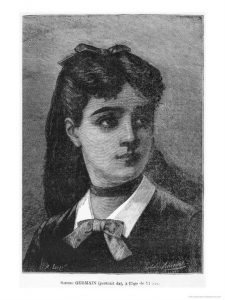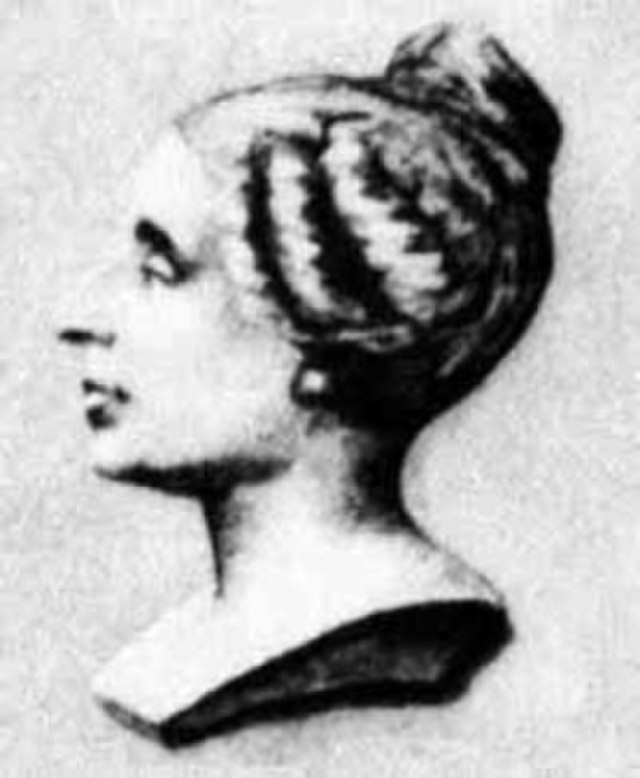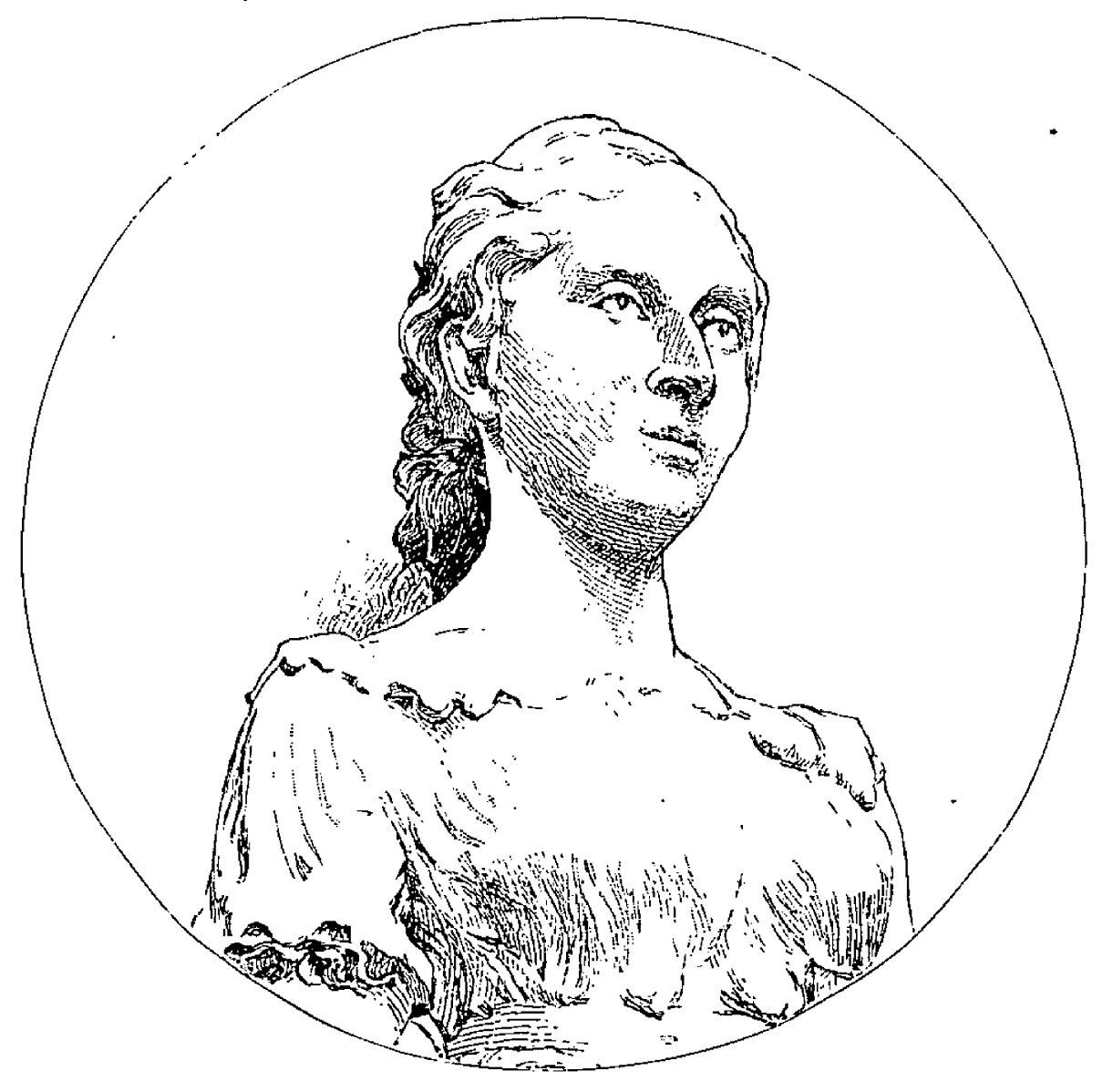 Sophie Germain
Sophie Germain
*April 01, 1776 (Paris, France)
†June 27, 1831 (Paris, France)
french mathematician and philosopher
Sophie Germain came from the liberal educated middle class and was financially dependent on her family until the end of her life. She did not marry and her scientific achievements did not give her a position in society. For Germain, the significance of new scientific knowledge was in its value for science.
Self-taught, she learned Latin for understanding Newton‘s and Euler‘s works. Under restricted conditions, she followed Lagrange‘s lectures on analysis and sent him her elaborations under a male alias. After Lagrange wanted to meet the author of the mathematical elaborations personally, her true identity became known to the public as a sensation. Nevertheless, her isolation remained and Germain never became part of the public scientific community during her life. As a woman, she was denied admission to the parisian academy and first she was also denied participation in public meetings.
After studying Legendre‘s Théorie des nombres in 1798, she devoted herself to Gauss‘s Disquisitiones Arithmeticae in 1801. From 1804 to 1808 Germain was in correspondence with the German mathematician Gauss, again under a male pseudonym. The result of her number theoretic studies is the partial solution of the Fematic Conjecture. Her established mathematical theorem, today known as the Sophie-Germain theorem, proves a lot of mathematical special cases in her time. Inspired by Chladni‘s experiments with elastic plates (1808), she worked on the mathematical theory of elastic surfaces. She wrote three papers on the plate theory in 1811, 1813, and 1815, receiving the Prix extraordinaire of the Paris Academy for the last paper.
In addition to mathematics, she dealt with philosophical questions. In her scientific-theoretical essay Considérations générales sur l’état des sciences et des lettres aux différentes époques de leur culture, she represents the conviction of a similar way of thinking in the natural sciences and the humanities. According to Germain, universal basic structures of thought underlie all human activities and the existance of specific laws determine all actions. She demands exact terminology in all fields of science and human development history and pleads that philosophy should become an exact science.
Sophie Unger
-
Primary Sources
Germain, Sophie 1821. Recherches sur la théorie des surfaces élastiques. Paris: Courcier.
Germain, Sophie 1826. Examen des principes qui peuvent conduire à la connaissance des lois de l’équilibre et de mouvement des solides elastiques. Paris.
Germain, Sophie 1828 Examen des principes qui peuvent conduire à la connaissance des lois de l’équilibre et de mouvement des solides elastiques. Paris.
Germain, Sophie 1879. Oeuvres philosophiques de Sophie Germain. Hg. v. Stupuy Hippolyte. Paris: Paul Ritti.
Germain, Sophie 1879. Philosophie moderai. Oeuvres philosophiques : Suivies de pensées et de lettres inédites et précédée d’un notice sur sa vie et ses oeuvres par H-te. Stupuy. Paris.
Germain, Sophie 1880. Cinq lettres de Sophie Germain a Charles-Frédéric Gauss. Berlin: Inst. de Photolithogr. des Frères Burchard; Schade.
Germain, Sophie 1896. Oeuvres philosophiques. nouv. ed. Paris: Firmin-Didot (Philosophie moderne).
Germain, Sophie 1931. Allgemeine Betrachtungen über die Beschaffenheit der Wissenschaften und Literatur in ihren verschiedenen Entwicklungsstufen. Unter Mitarbeit von Lilly Michaelis. Leipzig: Reisland.
Germain, Sophie 2013. Recherches sur la théorie des surfaces élastiques. Cambridge: Cambridge University Press (Cambridge library collection. Mathematics).
Germain, Sophie 2016. Œuvres philosophiques de Sophie Germain. Paris: BnF-P.
-
Secoundary Sources
Altenbach, Holm 2018. Germain, Marie-Sophie. In: Encyclopedia of Continuum Mechanics. Berlin, Heidelberg: Springer, 2019.
Biedenkapp, Georg 1910. Sophie Germain, ein weiblicher Denker. Mit einer Übersetzung ihrer “Allgemeinen Betrachtungen über den Stand der Wissenschaften und Literaturen in den verschiedenen Kulturepochen”. Jena: Schmidt.
Borgato, Maria Teresa; Neuenschwander, Erwin; Passeron, Irène (Hg.) 2018. Mathematical correspondences and critical editions. Cham, Switzerland: Birkhäuser (Springer eBook Collection).
Bucciarelli, Louis L.; Dworsky, Nancy 1980. Sophie Germain. An essay in the history of the theory of elasticity. Dordrecht, Netherlands: D. Reidel Publishing Company (Studies in the history of modern science, Volume 6).
Carpinteri, Alberto 2017. Advanced Structural Mechanics. London: Taylor & Francis Group.
Case, Bettye Anne 2016. Complexities. Women in Mathematics. Princeton: Princeton University Press.
Crelle, A. L. (Hg.) 2021. Journal für die reine und angewandte Mathematik. Band 7. Unter Mitarbeit von Möbius A. F., Hill C. J. D., Gudermann C., Minding Ferd., Libri G., Magnus L. J. et al. Reprint 2020. Berlin, Boston: De Gruyter (Journal für die reine und angewandte Mathematik, Band 7).
Dahan-Dalmédico, Amy 1992. Sophie Germain. In: Spektrum der Wissenschaft.
Dussaud, René 1991. Le théorème de Sophie Germain et les automorphismes de structure. Chambéry (54, rue de la Paix), Neuchâtel: Centre de recherches en mathématiques pures (Publications du Centre de recherches en mathématiques pures. Série 2, 9).
Dussaud, René 1994. Formules de Bairstow et courbes algébriques ;. Critère de Sophie Germain étendu : tables et commentaires. Neuchâtel, Chambéry: Centre de recherches en mathématiques pures (Publications du Centre de recherches en mathématiques pures. Série 1, fasc. 25).
Dussaud, René 1994. Théorème de Sophie Germain et diviseurs premiers. In: An inequality suggested by Lyapunov’s inequality.
Faulkner, Nicholas 2016. Top 101 Women of STEM. Chicago, IL: Britannica Educational Publishing (People You Should Know II).Frize, Monique 2009. The bold and the brave. A history of women in science and engineering. Ottawa: University of Ottawa Press.
Gaston-Bird, Leslie 2019. Women in audio. First edition. New York: Focal Press (Audio Engineering Society Presents).
Göring, Hugo 1878. Sophie Germain, ein Lebensbild aus der Geschichte der Philosophie. Basel.
Göring, Hugo 1879. Sophie Germain. Ein Lebensbild aus der Geschichte der Philosophie. Basel: Wittmer (Bericht der Gewerbeschule zu Basel, 1878/79).
Göring, Hugo 1889. Sophie Germain und Clotilde de Vaux. Ihr Leben und Denken. Zürich: Schröter & Meyer.
Herbst, Marina 2007. Untersuchung der oberen Schranke für Sophie-Germain-Begleitprimzahlen. Konstanz, Univ., Diplomarbeit, 2007.
Herbst, Marina 2008. Untersuchung der oberen Schranke für Sophie-Germain-Begleitprimzahlen. Konstanz, Universität
Konstanz, Diplomarbeit, 2007. Konstanz: Bibliothek der Universität Konstanz.
Hagengruber, Ruth (Hg.) (1998): Klassische philosophische Texte von Frauen. München: Dt. Taschenbuch-Verl. S.
Hocquemiller, Marcel; Dussaud, René 1991. Contribution numérique à l’étude d’un système congruentiel. Neuchâtel: Centre de recherches en mathématiques pures (Publications du Centre de Recherches en Mathématiques Pures 1.Série, 22).
Kaufholz-Soldat, Eva; Oswald, Nicola M.R. (Hg.) 2020. Against All Odds. Women’s Ways to Mathematical Research Since 1800. 1st ed. 2020. Cham: Springer International Publishing; Imprint Springer (Springer eBook Collection, 6).
Kleiner, Israel 2012. Excursions in the History of Mathematics. Boston: Springer Science+Business Media LLC.
Klens, Ulrike 1994. Mathematikerinnen im 18. Jahrhundert. Maria Gaetana Agnesi, Gabrielle-Emilie DuChâtelet, Sophie Germain ; Fallstudien zur Wechselwirkung von Wissenschaft und Philosophie im Zeitalter der Aufklärung. Zugl.: Augsburg, Univ., Diss., 1992. Pfaffenweiler: Centaurus-Verl.-Ges (Forum Frauengeschichte, 12).
Leibrock, Gerd 2001. Meine Freundin Sophie. Carl Friedrich Gauß’ Brieffreundschaft mit Sophie Germain. In: Mitteilungen.
Łukasik, Radosław 2018. On an Equation of Sophie Germain. In: Results in mathematics 73 (2), S. 1–7.
Marshall, David C. 2007. Number Theory through Inquiry. Unter Mitarbeit von Edward Odell und Michael Starbird. Washington: American Mathematical Society (MAA Textbooks).
Meyer, Ursula; Bennent-Vale, Heidemarie (Hg.) 1997. Philosophinnen Lexikon. Leipzig: Reclam.
Mordell, L. J. 1929. Le dernier théroème de Fermat. Résumé des travaux de Kummer, Libri, Sophie, Germain et Wendt; état actuel de la question. Paris: Gibert.
Musielak, Dora 2012. Sophie’s Diary. A Mathematical Novel. Washington: American Mathematical Society (Spectrum).
Musielak, Dora 2020. Sophie Germain. Revolutionary mathematician. Second Edition. Cham: Springer Nature (Springer Biographies).
Mussardo, Giuseppe 2020. The ABC’s of Science. Cham: Springer International Publishing AG.
Ornes, Stephen 2009. Sophie Germain. 1. ed. Greensboro, NC: Morgan Reynolds Publ (Profiles in mathematics).
Osen, Lynn M. 1974. Women in mathematics. Cambridge, Mass.: MIT Press.
Pecout, Christelle 2021. Women Discoverers. Top Women in Science. Unter Mitarbeit von Marie Moinard. Chicago: NBM Publishing (NBM Comics Biographies).
Posamentier, Alfred S.; Spreitzer, Christian 2020. Math makers. The lives and works of 50 famous mathematicians. Guilford, Conneticut: Prometheus Books.
Ribenboim, Paulo 1979. 13 Lectures on Fermat’s Last Theorem. New York, NY: Springer New York (Springer eBook Collection Mathematics and Statistics).
Sab, Karam; Lebée, Arthur 2015. Homogenization of heterogeneous thin and thick plates. London: ISTE (Mechanical engineering and solid mechanics series).
Shaughnessy, Michael F. 2018. The Life and Times of the World’s Most Famous Mathematicians. New York: Nova Science Publishers Incorporated (Mathematics Research Developments Ser).
Stupuy, Hippolyte 1879. Oeuvres philosophiques de Sophie Germain. Suivies de pensées et de lettres inédites et précedées d’une notice sur sa vie et ses oeuvres. Paris: Paul Ritti librairie-éditeur (Philosophie moderne).
Tietjen, Jill S. 2017. Engineering Women. Cham: Springer International Publishing AG (Women in Engineering and Science Ser).
Tietjen, Jill S. 2020. Scientific Women. Re-Visioning Women’s Scientific Achievements and Impacts. Cham: Springer International Publishing AG (Women in Engineering and Science Ser).
Toti Rigatelli, Laura 2007. Sophie Germain. Una matematica dimenticata. Milano: Archinto (Le mongolfiere).
Tsjeng, Zing 2018. Forgotten women. The scientists. London, U.K, New York, NY: Cassell Illustrated; Distributed in the US by Hachette Book Group.
W., E. 1889. Sophie Germain, ihr Leben und ihre Werke. In: Die Lehrerin in Schule und Haus.
- Online Sources
You cannot copy content of this page











